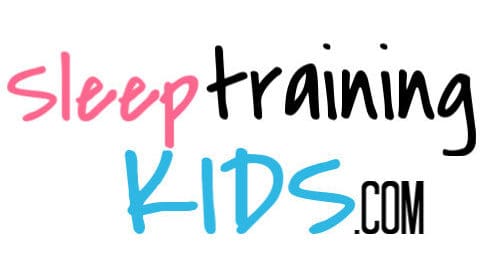Just when you think your baby is in a routine – suddenly it can change for no apparent reason. Things that can disrupt a baby’s sleep, aside from wet diapers, are sleep regressions and growth spurts. Signs of a growth spurt and sleep regression are similar, so how do you tell the difference?
A growth spurt is when a baby grows or gains weight quickly or develops a new physical or mental skill. Sometimes a growth spurt can lead to a sleep regression, and the two can overlap. However, many things aside from growth spurts can also cause sleep regressions.
Knowing the difference between a sleep regression and a growth spurt can minimize the damage caused by sleep disruptions. So, take a look at the information below to get a better understanding of the difference between growth spurts and sleep regressions.

Symptoms of Sleep Regressions and Growth Spurts
Weight gain, growth, and development can all be signs of a growth spurt. They are also a sign that your baby is close to a major development milestone. Sleep regression happens because of different physical, biological, psychological, or environmental changes.
During a growth spurt, a baby needs extra calories to grow, and hunger is one of the telltale signs of a growth spurt. Furthermore, babies may wake up more times during the night for extra feeding, and this is why it’s easy for parents to confuse a growth spurt with sleep regression.
Each baby is different when it comes to dealing with growth spurts and sleep regressions. Some babies will get over a sleep regression in just a few days, while others may take several weeks. However, a growth spurt shouldn’t last for more than a week.
What are the Signs of a Growth Spurt?
During a growth spurt, some babies will be constantly hungry, no matter how much you feed them. On top of this, your baby might be crankier and more demanding than usual and may spend more time sleeping.
Babies go through growth spurts when they are around 1 to 3 weeks, 6 to 8 weeks, 3 months, 6 months, and 9 months old. However, each baby is different, and this schedule may vary. We’ll take a closer look at 3 symptoms that may indicate your baby is going through a growth spurt.
Hunger
Hunger is one of the most obvious signs of a growth spurt, and the baby can usually be calmed with feeding. Your baby needs lots of calories to grow, so their feeding routine can go completely off course during a growth spurt. Most babies will demand extra feeding during this time.
When breastfeeding a baby, you’ll naturally produce more milk to meet the baby’s demands. With bottle-fed babies, make sure to have extra formula on hand. In either case, feed the baby as per their demands. More diaper changes can also be expected with a growth spurt due to the extra food.
Crankiness
During a growth spurt, a baby might be constantly hungry and wake up for more feeding during the night. When a baby is hungry and tired, it’s only normal that they will be cranky. The best way to soothe a cranky baby during a growth spurt is by giving them lots of extra comforts.
Pro tip: Cranky is different than “irritable” in the medical sense. Speaking from experience as a nurse, an “irritable” baby is one that just won’t stop crying – for hours and hours on end. This could mean there’s something really wrong to the point that the baby needs immediate medical attention.
An “irritable” baby won’t always have an obvious problem, but it’s always a good idea to listen to that gut feeling that’s saying something is wrong. If you’re ever not sure if your baby is “cranky” versus “irritable,” don’t feel bad about asking your doctor for advice.
Sleep Disturbances
A baby’s sleep schedule may be disrupted during a growth spurt. Some babies will wake up for extra feeding during the night, or sleep for longer periods during the day. Babies might sleep less during a growth spurt.
To help your baby get through sleep disturbances during a growth spurt, try and stick to their sleep schedule as much as possible. Give babies extra comfort at bedtime and offer them a dream feed before you go to bed at night.
What’s a dream feed? Read more about feeding baby at night (called dream feeding) in our article here: Do You Feed Baby When Sleep Training? (Plus 11 Tips).

Is Sleeping a Lot a Sign of a Growth Spurt?
Sleeping can be an early sign of a growth spurt in babies and children. When they’re asleep, babies produce more human growth hormone HGH, which helps with physical development, so it’s possible they might sleep more. It takes a lot of energy to grow, and that can leave a baby feeling tired.
Babies grow 10 inches and triple their weight in the first year, and they do most of their growing in short, intense bursts. Sometimes it will seem like your baby has suddenly grown overnight.
If a baby is sleeping more during a growth spurt, don’t worry, just enjoy the extra quiet time. In some cases, a baby might sleep less during a growth spurt, and this is perfectly normal too.
Should you let your baby sleep when growing or sick? Read more about when you should or shouldn’t in our article here: Should a Sick Baby Sleep All Day?
Do Growth Spurts Cause Sleep Problems?
Not all babies will experience sleep problems or disturbances with a growth spurt. Some babies will even sleep more. However, if a growth spurt coincides with a major development milestone, sometimes that can cause a sleep regression.
To reduce the chances of a growth spurt leading to a sleep regression, stick to a regular sleeping routine as much as possible. In most cases, the baby will settle back into a sleep routine once the growth spurt is over.
If the sleep problems last longer than a week, this may indicate other issues like illness or sleep regression.
What is Sleep Regression?
A sleep regression is when for some reason a baby’s sleep pattern becomes seriously disrupted. Sleep regressions can last for a few days or several weeks, and they usually occur when the baby reaches major development milestones.
The first regression usually occurs at 4 months old when babies transition from infant to adult sleep cycles. At 4 months babies develop their cardiac rhythm and it can take them a while to get used to the concept of day and night.
Newborn babies under 4 months don’t really have regressions because their sleep cycles are pretty erratic anyway.
At three to five months old, babies learn to make sounds and start rolling over. Sometimes, they are so overstimulated by these new activities that it will cause sleep regression. At age eight to ten months, babies start to talk and crawl, and these new skills can also trigger a sleep regression.
Other things besides growth spurts and major development milestones can cause sleep regression. These include environmental disturbances, time changes, teething, and illness.

How Do I Know if My Baby is Having a Sleep Regression?
When a baby is going through a sleep regression, the first thing that will happen is a change in their sleeping patterns. The baby may also be more irritable due to the lack of sleep and demand extra comfort.
Not all babies go through a sleep regression, and some babies deal with them much better than others. Overall, sleep regression can be a very challenging time for parents.
As a general rule, babies will usually go through sleep regressions at 4 months, 3-5 months, 8 to 12 months,15 to 18 months, and 2 years. However, not all babies will follow this schedule, and many things can trigger sleep regression.
You can read more about sleep regressions and when they happen in our article here: Can Sleep Regressions Start Early or Late?
Sleep Regression Symptoms
The main symptoms of sleep regression are sleep disturbances – which will usually affect both daytime and nighttime sleeping patterns. Your baby might seem very sensitive and irritable during a sleep regression, and it may be difficult to comfort them.
Here are the main three symptoms of sleep regression:
Sleep disturbance
Sleep disturbances are the first sign that a baby is going through a sleep regression. With a sleep regression, the baby may have trouble settling down at night. This will be followed by frequent night waking and early wake-up times in the morning.
Nighttime disturbances may have an effect on daytime sleep patterns. Overall, with a sleep regression, the baby’s sleep routine will become quite erratic and both parents and the baby may find themselves sleep-deprived.
Bad mood
A lack of sleep combined with physical and emotional changes will often leave a baby feeling quite cranky and irritable during a sleep regression. It may take longer to settle them down for naps and at bedtime, and it might be hard to soothe them.
Neediness
During a sleep regression, babies feel pretty stressed out with the new changes. Your baby might seem more needy than usual and demand more cuddles, comfort, and attention.

Sleep Regression and Growth Spurt Tips
Whether they are caused by a sleep regression or growth spurt, sleep disturbances can be stressful for both parents and their babies. The best way to work through sleep disturbances is by staying calm and sticking to a solid sleep routine as much as possible.
Sleep regressions and growth spurts are a normal part of a baby’s development, but they can be challenging for the parents. Take a look at our tips below to find out about the best way to deal with night waking.
Stay calm
During night waking, keep yourself and the environment calm. Keep lights, noise, and activity to a minimum so that the baby isn’t overstimulated. When the baby is in a calm, dark environment it’s easier for them to fall back asleep.
Be flexible
If there is a sleeping routine in place, stick to it as much as possible during growth spurts and sleep regressions. If the baby is between 4 and 6 months old, consider sleep training if you haven’t already. Overall, the baby will sleep better if they have a solid sleeping routine in place.
However, be flexible with the routine. If the baby genuinely needs comfort because they are in pain or suffering, give it to them. Your baby’s well-being is more important than sleep training.
Rule out illness
If the baby has symptoms such as a fever, pain, or stomach upset when they wake up at night, these could be a sign of illness. If concerned about your baby’s health or worried about their sleep routine, always seek advice from a medical professional.
Offer extra comfort
Growth spurts and sleep regressions can be very stressful for some babies. Give your baby lots of comforts to lower their stress levels, especially at bedtime. Soothe them with a gentle massage and warm bath. If the baby isn’t rolling over yet, try swaddling them for comfort.
Ask for help
Sleep regressions and growth spurts are stressful for parents too. If your health is suffering because of the baby’s night waking, don’t be afraid to ask for help. A partner, friend, or family would more than likely be happy to help.
And if your partner isn’t totally on board with sleep training or sleep regression support, make sure you read our article here: What to Do When Your Partner Won’t Sleep Train Baby. It’s got real-world, actually helpful tips on helping you communicate with your partner so everyone sleeps better.
Remember this is a phase
Sleep deprivation is tough on the human body. If you are feeling down about lack of sleep and the baby’s hectic sleeping routine, don’t worry, this is perfectly normal. As hard as it might be, try and stay positive. Remember, sleep regressions and growth spurts are just phases that will pass.
Key Takeaways and Next Steps
To minimize the stress that comes with nighttime disturbances, try to stick to the baby’s sleeping routine as much as possible. During a sleep regression or growth spurt, give your baby lots of extra comforts, especially around bedtime.
If your baby wakes up distressed at night, keep the room cool and dark. Overall, sleep is important for your baby’s development, so always consult a health care professional if you have any concerns about your baby’s health or sleeping habits.
When learning about parenting or sleep training techniques, it’s important to learn from a wide variety of reputable sources. I’ve got a variety of articles here on this site, so feel free to click on the one that appeals most to you or whatever question you’ve got next:
- What is a Sleep Regression?
- Can Sleep Regressions Start Early or Late?
- Sleep Regression and Time Change (What You Need to Know)
If daylight savings is due to hit (and it’s always happening at the worst time possible, if you ask me!), then make sure you click that last link. It’ll walk you through everything I’ve learned about how to make a time change with a baby less awful.
Resources
Learning about parenting or sleep training techniques is important to learn from various reputable sources. These are the sources used in this article and our research to be more informed as parents.
- Anders, Thomas F., et al. “Sleeping Through the Night: A Developmental Perspective.” Pediatrics, vol. 90, no. 4, 1992, pp. 554–60. Crossref, doi:10.1542/peds.90.4.554.
- “From Safe Sleep to Healthy Sleep: A Systemic Perspective on Sleep In.” University of Washington, depts.washington.edu/nwbfch/infant-safe-sleep-development. Accessed 20 Jan. 2022.
- “Infant Development: Milestones from 10 to 12 Months.” Mayo Clinic, 25 June 2020, www.mayoclinic.org/healthy-lifestyle/infant-and-toddler-health/in-depth/infant-development/art-20047380?reDate=20012022.
- Lampl, Michelle, and Michael L. Johnson. “Infant Growth in Length Follows Prolonged Sleep and Increased Naps.” Sleep, vol. 34, no. 5, 2011, pp. 641–50. Crossref, doi:10.1093/sleep/34.5.641.
- McTigue, Sara. “Understanding Baby Growth Spurts.” Healthline, 16 Dec. 2019, www.healthline.com/health/baby/baby-growth-spurts#what-they-are.
- “Your 5-Month-Old Baby’s Development and Milestones.” Verywell Family, 19 Jan. 2022, www.verywellfamily.com/your-5-month-old-baby-development-and-milestones-4172566.
